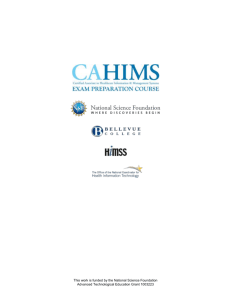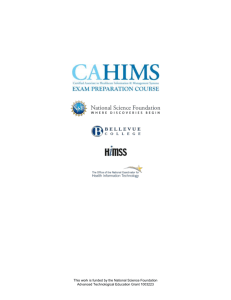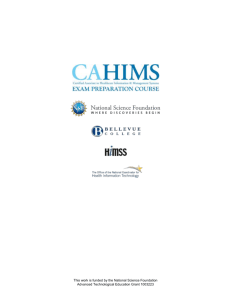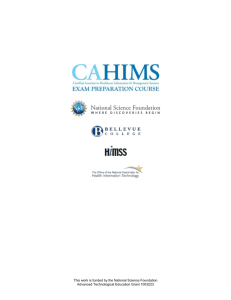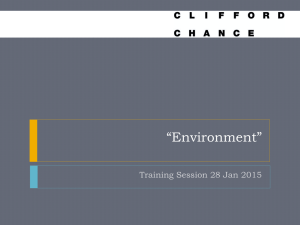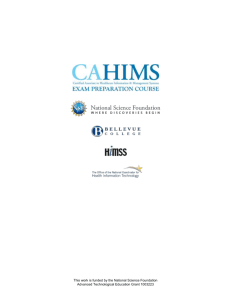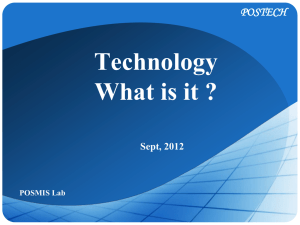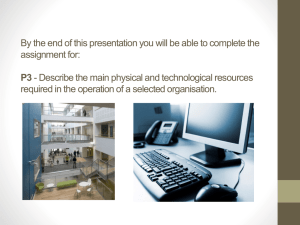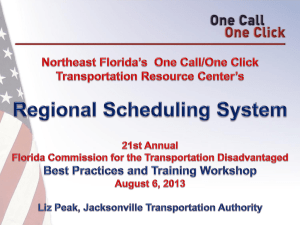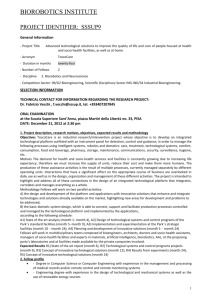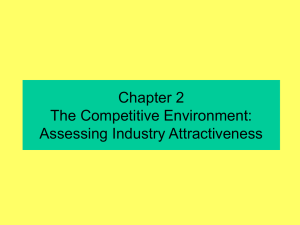9.2-Assessment-Key
advertisement
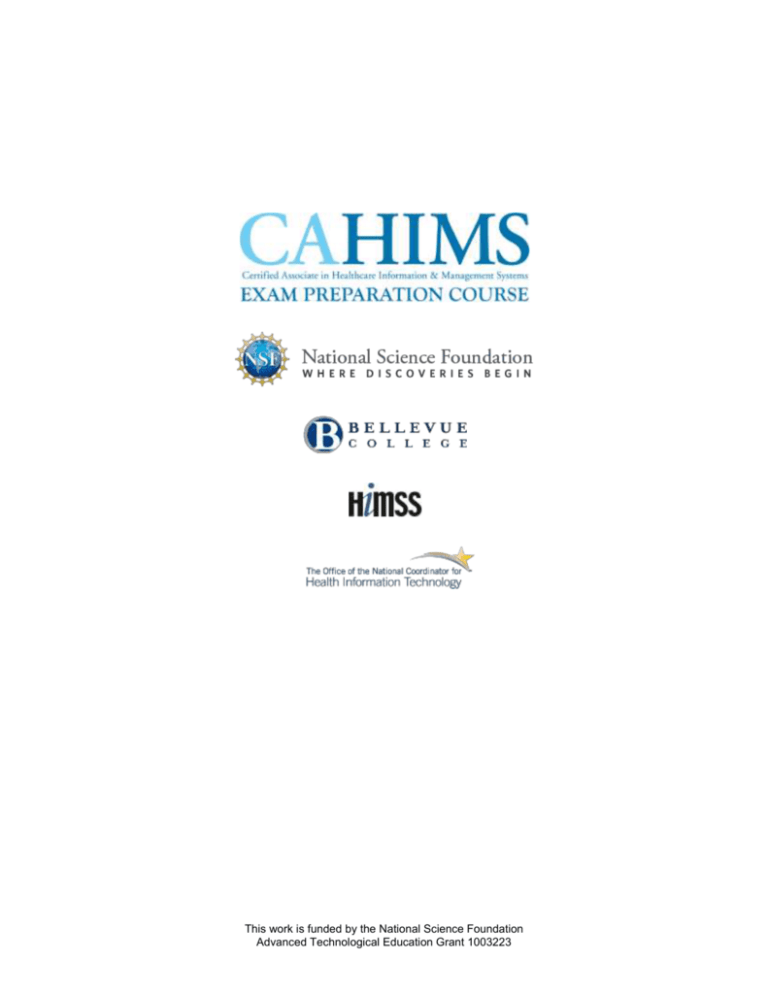
This work is funded by the National Science Foundation Advanced Technological Education Grant 1003223 The CAHIMS Exam Preparation Course and the CAHIMS exam are the result of collaboration between the Life Science Informatics Center at Bellevue College and the Healthcare Information and Management Systems Society (HIMSS). Significant content found in the CAHIMS Exam Preparation Course stems from the Office of the National Coordinator for Health Information Technology. Creation of the CAHIMS Exam Preparation Course and the CAHIMS exam was made possible through support from the National Science Foundation (NSF). Curriculum Team: Margaret Schulte, DBA Michèle Royer, PhD Nathan Savage, MLIS This work is funded by the National Science Foundation Advanced Technological Education Grant 1003223 Section 9 - Professionalism and Communication Skills Lesson 9.2 - Teams and Team Building Assessment Questions Answer Key Lectures 1 & 2 1. Care coordination __________. a. only refers to transitions from hospital to community-based care and vice versa b. can occur in the absence of clinical integration c. is most important for patients with acute conditions *d. has been identified as the top priority for national action Answer. d. Care coordination was identified as the number 1 priority for national action in the 2003 Institute of Medicine consensus report on priorities necessary to transform health care quality. Lecture/Slide: 1/3 2. Which of the following is not an example of a transition of care? a. provider-to-provider (within facility) b. discharge to home *c. change in patient room without change in providers d. care area to care area (within facility) Answer. c. Transitions of care occur when there are changes in providers, physical moves of the patient from one unit or facility to another, or when the responsibility for patient care changes from one clinical service to another. Lecture/Slide: 1/5 3. Hand-offs __________. a. are rarely the cause of medical error b. have decreased with reduced resident duty hours c. are not necessary for temporary coverage during lunch breaks *d. are transfers of care from one provider to another provider Answer. d. Hand-offs are transfers of care from one provider to another. They are often vulnerable to communication failure, and, as such, have been found to be associated with medical error. Decreased residency duty hours result in an increase in hand-offs, thus increasing risk. Any time care is transitioned from one provider to another, even when only for short periods, requires a hand-off. This work is funded by the National Science Foundation Advanced Technological Education Grant 1003223 Page 1 Lecture/Slide: 1/5-9 4. Studies show that which of the following is true about most hospital discharges? *a. Direct communication between hospital and primary care providers is low. b. The availability of discharge summaries is high four weeks post-discharge. c. The primary mode of communication to post-discharge providers is by telephone. d. Discharge summaries usually provide the primary provider with the information needed to effectively care for the patient. Answer. a. Researchers have examined deficits in communication and information transfer at hospital discharge and found that direct communication between hospital physicians and primary care providers occurred only 3-20% of the time. Lecture/Slide: 1/10 5. A technique that examines relations among providers and looks to see patterns among groups to inform information technology decision making is __________. a. contact exchange b. group process c. systems analysis *d. social network analysis Answer. d. Social network analysis can be helpful to examine patterns of interactions among health care providers to identify opinion leaders who are critical to the success of information technology adoption. Lecture/Slide: 2/8, 9 6. Which of the following is an example of a social function meaning to a speech act? a. “It’s hot in here” means “The temperature is too warm for my taste.” *b. “It’s crowded in here” means “I want to leave.” c. “The knife is dull” means “the blade of the knife is blunt.” d. “The computer is slow” means “The processing time is less than the standard.” Answer. b. The social function meaning of speech is when someone says one thing, but is really hinting at something else. Lecture/Slide: 2/11 This work is funded by the National Science Foundation Advanced Technological Education Grant 1003223 Page 2 Lectures 3 & 4 7. The use of teams is a means by which organizations can become “flatter.” Which of the following is an explanation of this phenomenon? a. Teams iron out problems within the organization, therefore upper level management isn’t needed for most tasks. b. Teams negate competition between organizations by creating a cooperative atmosphere. *c. Teams eliminate the use of middle management and give more power to an organization’s employees. d. Teams tend to decrease the productivity of an organization and therefore lower its ability to compete. Answer: c. Teams eliminate the use of middle management and give more power to an organization’s employees. Lecture(s)/Slide(s): 3/3 8. According to the lecture, which option represents the key difference between teams and groups? a. The caliber of communication skills needed for individuals *b. The accountability and production of individuals and the collective body c. The level of outside resources needed to produce the desired goal d. The managerial philosophies Answer: b. The accountability and production of individuals and the collective body Lecture(s)/Slide(s): 3/11 9. Documentation is essential in all EXCEPT: a. Clarifying goals b. Defining Roles c. Effective decision making *d. Creating a positive atmosphere Answer: d. Creating a positive atmosphere Lecture(s)/Slide(s): 3/20-23 This work is funded by the National Science Foundation Advanced Technological Education Grant 1003223 Page 3 10. Manager Margaret is having problems with “he said, she said” statements within her team. The team has changed their work goals three times and now roles are misunderstood. Which option would most likely have prevented Manager Margaret’s problems? a. Conducting the initial meeting as a stress free social event that included completion of personality profiles b. Discussing goals, roles, and procedures more thoroughly from the beginning c. Continuously communicating the value of each person’s perspective *d. Documenting all communications pertinent to the project’s progress Answer: d. Documenting all communications pertinent to the project’s progress Lecture(s)/Slide(s): 3/20-22 11. According to the lecture, which option best defines GroupThink? a. Giving each team member’s suggestion or idea at least five minutes of affirmation and consideration b. Brainstorming ideas within a virtual team c. Analyzing a group’s consensus against the team’s objectives and goals *d. Restricting conflicting ideas that result in minimized teamwork Answer: d. Restricting conflicting ideas that result in minimized teamwork Lecture(s)/Slide(s): 4/11 Lectures 5 & 6 12. A team is defined as a small number of people with complementary skills who are committed to: a. common purpose b. performance c. goals d. approach *e. all of the above Answer: e. all of the above. Lecture(s)/Slide(s):5/7 13. Which of the following is not an important feature of team members? a. communication *b. non-integrated tasks This work is funded by the National Science Foundation Advanced Technological Education Grant 1003223 Page 4 c. coordination d. distinctive roles e. shared norms Answer: b. non-integrated tasks Lecture(s)/Slide(s): 5/7 14. Teams can be viewed as a three-stage system that includes all but which of the follow? a. input – resources teams use b. throughput – care of internal processes *c. calculation – summing individual efforts d. output – production of specific products Answer: c. calculation – summing individual efforts Lecture(s)/Slide(s): 5/9 15. Characteristics of effective teamwork include all but which of the following? *a. non-focused groups b. organizational structure c. individual contribution d. team processes Answer: a. non-focused groups Lecture(s)/Slide(s): 5/11 16. At a minimum, individual participation in teams requires which of the following? a. self-knowledge b. trust c. commitment d. flexibility *e. all of the above Answer: e. all of the above Lecture(s)/Slide(s): 6/10 This work is funded by the National Science Foundation Advanced Technological Education Grant 1003223 Page 5 17. Performance feedback should include all but which of the following? a. provide timely and accurate information *b. focus on the past c. use open communication channels d. target team performance e. focus on the future Answer: b. focus on the past Lecture(s)/Slide(s): 6/21 18. What can exist in health care environments due to clinical responsibilities, training needs, and issues of patient safety and confidentiality? *a. potential for conflict b. clear path to large profits c. simple action plans for team activity d. little need for leadership Answer: a. potential for conflict Lecture(s)/Slide(s): 6/6-8 Lecture 7 19. Which of the following is NOT true? a. Teams can do much more with technology support. b. Team members have greater responsibility because more information is available to them. *c. Teams should start with the technology before finding ways to use it. d. Teams should always keep goals in clear view and use tools to help reach them. Answer: c. Teams should start with the technology before finding ways to use it. Lecture/Slides: 7/3 20. Signal types include all BUT which of the following? *a. Blackberry b. WiFi c. 3G d. 4G This work is funded by the National Science Foundation Advanced Technological Education Grant 1003223 Page 6 Answer: a. Blackberry Lecture/Slides: 7/6 21. Examples of tools for interaction that are asynchronous are all BUT which of the following? a. Basecamp b. Sharepoint c. Confluence *d. GoToMeeting Answer: d. GoToMeeting Lecture/Slides: 7/8 22. Which of the following is mainly used as a tool for synchronous collaboration? *a. Adobe Connect b. Sharepoint c. Basecamp d. Sharepoint Answer: a. Adobe Connect Lecture/Slides: 7/8 23. Tools for collaborative document development include all BUT which of the following? a. Socialtext b. Kablink *c. WritePerfect d. Colaab Answer: c. WritePerfect Lecture/Slides: 7/9-14 This work is funded by the National Science Foundation Advanced Technological Education Grant 1003223 Page 7 24. All BUT which of the following is true of tools for collaborative document development? *a. provides no real impact on HIT processes b. paper trails are replaced by immediate and permanent records c. some people are initially discomforted by these tools d. commitment is typically required from senior management Answer: a. Provides no real impact on HIT processes Lecture/Slides: 7/9-14 25. Teams that demonstrate high ability to share resources and information will most likely meet all BUT which of the following? a. produce a greater number of creative ideas b. provide higher quality decisions *c. consider less information d. offset personal bias Answer: c. consider less information Lecture/Slides: 7/12 Lecture 8 26. High performance is described by all BUT which of the following statements? a. not a destination, but a goal to experience *b. arrival is permanent, once achieved the team is there for good c. preparation is key d. will push the limits on team effectiveness Answer: b. arrival is permanent, once achieved the team is there for good Lecture(s)/Slide(s): 8/4 27. High- performance teams exhibit all dimensions EXCEPT which of the following? *a. tend to be built by the boss b. are developed by each and every team member working together c. require high levels of individual commitment to tasks d. all members have share in controlling the team Answer: a. tend to be built by the boss This work is funded by the National Science Foundation Advanced Technological Education Grant 1003223 Page 8 Lecture(s)/Slide(s): 8/4-6 28. The value of the phrase to, “put your eggs in one basket,” regarding high performance teams is best classified by which of the following statements? a. all resources should be gathered in a single space b. team members should always put their heads together when working on a task c. teams should develop one, “catchment,” area for all decisions *d. teams should deal with challenges in a way that is unique and not follow the routine or processes of other teams Answer: d. teams should deal with challenges in a way that is unique and not follow the routine or processes of other teams Lecture(s)/Slide(s): 8/10 29. One way to insure that teams enhance their ability to perform is to do which of the following? *a. invite constructive feedback and feedforward from team members b. attempt to remain in the “forming” stage of team development as long as possible c. protect other team members from bad news d. always say “yes” to whatever the boss wants to hear Answer: a. invite constructive feedback and feedforward from team members Lecture(s)/Slide(s): 8/8 30. Significant impact can be made on the success of a high performance team by doing which of the following? a. spend 95 percent of your work week designing and assessing performance on team ground rules and action plans b. spend 50 percent of your work week designing and assessing performance on team ground rules and action plans *c. spend 3 percent of your work week designing and assessing performance on team ground rules and action plans d. spend no time designing and assessing performance on team ground rules and action plans Answer: c. spend 3 percent of your work week designing performance on team ground rules and action plans This work is funded by the National Science Foundation Advanced Technological Education Grant 1003223 Page 9 Lecture(s)/Slide(s): 8/11 31. High-performance teams require a structure that includes all BUT which of the following? a. clear purpose b. specified tasks c. distinct roles *d. no leadership Answer: d. no leadership Lecture(s)/Slide(s): 8/13 32. Because leadership is shared in high-performance teams, individual members must contribute in all BUT which of the following areas? a. self knowledge *b. ego c. trust d. commitment e. flexibility Answer: b. ego Lecture(s)/Slide(s): 8/8-11 33. Although the experience of high performance can be somewhat brief, sustaining high performance is possible by targeting all BUT which of the following activities? a. develop a compelling saga b. don’t allow tools to run the team c. build partnerships *d. seek arrogance e. engage in ultra preparation Answer: d. seek arrogance Lecture(s)/Slide(s): 8/4-7 This work is funded by the National Science Foundation Advanced Technological Education Grant 1003223 Page 10 Lecture 9 34. True cohesive teams demonstrate which of the following? a. They trust one another. b. They engage in unfiltered conflict around ideas. c. Hold each other accountable for delivering against those plans. *d. All of the above Answer: d. All of the above Lecture/Slides: 9/11 35. All of the following are strategies to manage dysfunctional teams EXCEPT __________. a. Listen intently. *b. Avoid stating your observations with specific examples, this could be offensive. c. Create a safe discussion space. d. Collaborate on the best solutions. Answer: b. Avoid stating your observations with specific examples, this could be offensive Lecture/Slides: 9/23 36. To crystallize the underlying problems when you are dealing with dysfunctional teams, you could __________. a. Name the real problems that are causing the behavior. b. Ask someone who is not part of your team to interview team members in confidence. c. Try a web conference tool to enable anonymous input. *d. All of the above Answer: d. All of the above Lecture/Slides: 9/23 37. Teams that are lacking trust are incapable of engaging in unfiltered, passionate debate about key issues. *a. True b. False This work is funded by the National Science Foundation Advanced Technological Education Grant 1003223 Page 11 Answer: a. True Lecture/Slides: 9/8 Lectures 10 & 11 38. Which of the following best defines conflict? a. A disruption between two parties due to personality differences b. A situation that causes stress but is beneficial for progress *c. A perceived disagreement due to do social interaction resulting in uncooperativeness d. Underlying opposing viewpoints that break down communications within social groups Answer: c. A perceived disagreement due to do social interaction resulting in uncooperativeness Lecture(s)/Slide(s): 10/3 39. According to the lecture, which of the following options best describes cooperativeness? a. Not answering emails and calls concerning a debated issue b. Threatening to alert influential stakeholders if desires are not met *c. Conducting surveys, meetings, and follow-up visits to improve participants’ satisfaction d. Working together to produce a collective objective Answer: c. Conducting surveys, meetings, and follow-up visits to improve participants’ satisfaction Lecture(s)/Slide(s): 11/4-9 40. According to the lecture, which operation is best when responding to high pressured questions and challenges? a. Assure the party of your expertise and ability to bring about a satisfactory solution b. Direct the party to available resources for their investigation of answers to their questions *c. Respond with factual information and not speculation d. Ask the party what measures they have taken to learn answers and overcome challenges Answer: c. Respond with factual information and not speculation This work is funded by the National Science Foundation Advanced Technological Education Grant 1003223 Page 12 Lecture(s)/Slide(s): 11/14 This work is funded by the National Science Foundation Advanced Technological Education Grant 1003223 Page 13
